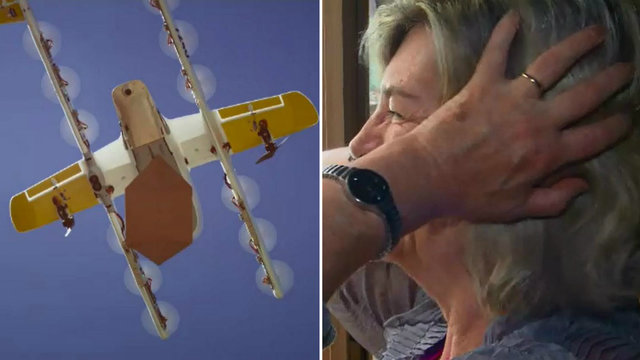Drone delivery is the new frontier of customer convenience in Australia – but not everybody is impressed. A trial conducted by Google spin-off company Wing is taking place in Canberra, and some neighbours of the suburb of Bonython are not happy.
Resident Neville told A Current Affair the drones sounded like an “F1 racing car”.
Robyn McIntyre claimed the local wildlife had vanished since the trial started. (A Current Affair)
“It’s very distressing to me and the family and, you know, everybody else who gets to experience it,” he said.
“The neighbourhood before was really very peaceful. We’ve got a pond not too far from here, a lot of wildlife, lots of birds, and they’ve all left since the trial has started.”
The drones used by Wing measure more than a metre long and have 12 propellers.

Residents opposed to the drone trial have raised concerns about noise and safety.
So far, they’ve buzzed their way to more than 2500 homes in the nation’s capital.
Residents opposed to the delivery drones are not only concerned about privacy, but also safety, given Australia’s civil aviation laws heavily restrict where most drones can fly.
Wing claims to use an unmanned traffic management platform, much like air traffic control, to avoid collisions.

Neville said the drones sounded like an F1 racing car. (A Current Affair)
In a statement to A Current Affair, Wing said they were trialling drone delivery as it was “far faster, safer and more environmentally friendly way of transporting things” and that the feedback they had received would help them improve.
“Our testers love the service and want a wider variety of things delivered, and some of their neighbors want us to make the drones quieter,” the statement read.
“In response to the feedback, we’ve developed and are testing a new propeller that makes the drone quieter and also lower pitched, so the drones blend in with other neighborhood sounds.”

Wing said it had developed a new propeller that made the drone quieter and lower-pitched. (A Current Affair)
Recreational drone users are restricted from flying a drone more than 120m above ground level, within 30 metres of anybody, from flying more than one drone at a time, and from flying at night without special approval.
Penalties can exceed $10,000 and reach up to five years in jail.
In Australia over Christmas, a drone pilot disrupted firefighting efforts in Tasmania, while in northern NSW emergency chopper flights were affected by a drone twice in one week.

Robyn said the noise was “distressing”. (A Current Affair)
And in the UK, drones hovering near Gatwick Airport just before Christmas disrupted more than 1000 flights.
Nonetheless, the drone industry in Australia has very much taken off, and is now worth more than $3 billion.

